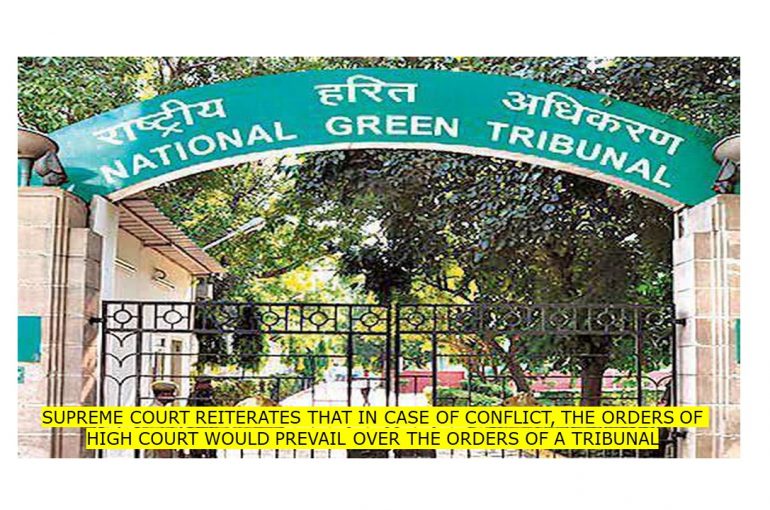SUPREME COURT REITERATES THAT IN CASE OF CONFLICT, THE ORDERS OF HIGH COURT WOULD PREVAIL OVER THE ORDERS OF A TRIBUNAL
In a recent Civil Appeal, a two Judge Bench of the Supreme Court comprising of Justice B.R. Gavai and Justice Hima Kohli passed an Order and Judgement dated 01.06.2022 in ‘The State of Andhra Pradesh v. Raghu Ramakrishna Raju Kanumuru (Civil Appeal No. 4522-4544 of 2022)’ and set aside the Orders dated 06.05.2022 and 20.05.2022 (Impugned Orders) passed by the National Green Tribunal, Delhi (NGT) and held that Tribunals like NGT are subordinate to High Court and in case of conflict, orders passed by the High Court would prevail over that of NGT.
In this case, the Appellant, the Andhra Pradesh Tourism Development Corporation Limited was running Haritha Resorts & Vihar at Rushikonda Hill, near Visakhapatnam. Since the Resort became old, it was demolished for reconstructing the Resort at the same place with additional facilities.
A Writ Petition bearing W.P. (P.I.L.) No.241 of 2021 challenging the reconstruction of the Resort was filed by one, P.V.L.N. Murthy before the High Court of Andhra Pradesh at Amarawati on 08.12.2021. The High Court passed an Order dated 16.12.2021, permitting the reconstruction in accordance with the applicable laws.
However, one, Raghu Ramakrishna Raju Kanumuru, the Respondent herein had sent a letter dated 31.10.2021 to the NGT 31.10.2021 requesting to stop the construction activities carried on by the Appellant at Rushikonda Hill, near Visakhapatnam. The NGT had appointed an Expert Committee on 17.12.2021 which submitted its Report to NGT on 29.03.2022, whereby it was stated that the Committee did not find any violation in the said construction activity that was carried out by the Appellant. However, the NGT vide Order dated 06.05.2022 formed another Expert Committee. The NGT then, by the same Order dated 06.05.2022, also directed that further construction cannot be undertaken by the Appellant. The Appellant-State then filed an Application before the NGT to vacate the stay on the construction, which was rejected by the NGT by Order dated 20.05.2022.
An Appeal was preferred by the Appellant before the Supreme Court against the Orders of the NGT dated 06.05.2022 and 20.05.2022. The Apex Court observed that no law is necessary to state that insofar as the Tribunals are concerned, they would be subordinate to the High Court in so far as the territorial jurisdiction of the High Court is concerned.
The Supreme Court further held that it was not appropriate on the part of the NGT to have continued with the proceedings before it, specifically, when it was pointed that the High Court was also hearing the matter and had passed an Interim Order dated 16.12.2021, permitting the reconstruction. Further, the conflicting Orders passed by the NGT and the High Court would lead to an anomalous situation, where the Authorities would be faced with a difficulty as to which order they are required to follow. The Apex Court held that there can be no manner of doubt that in such a situation, it is the orders passed by the Constitutional Courts, which would be prevailing over the orders passed by the Statutory Tribunals.
The Supreme Court, therefore quashed and set aside the Orders of the NGT and directed the High Court to consider all the facts and pass appropriate orders in accordance with law so as to strike a balance between the development and the environmental issues. Further, the Apex Court allowed the reconstruction only in the area where the construction existed earlier, until the High Court considers the issue at length. The Supreme Court, further added and held that though development is necessary for economical progress of the nation, it is equally necessary to safeguard the environment so as to preserve pollution free environment and ecology for the future generations to come.
Anuradha Kumari
Associate
The Indian Lawyer & Allied Services
Edited by
Sushila Ram Varma
Chief Consultant and Editor
The Indian Lawyer & Allied Services





































Leave a Reply